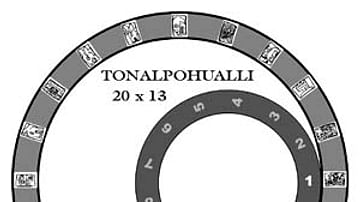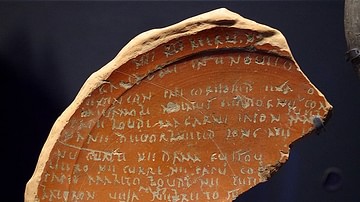Search
Search Results

Image
Tonalpohualli Mesoamerican Calendar
A representation of the Tonalpohualli – ‘Counting of the Days’ 260-day calendar used by ancient Mesoamerican cultures. Two systems ran simultaneously with a group of 13 numbered days combined with a group of 20 name days. Thus, each day had...

Video
The Maya Calendar, Culture and History: an Introduction to a Mesoamerican Civilization
The Maya are a people indigenous to Mexico and Central America who have continuously inhabited the modern regions of Yucatan, Quintana Roo, Campeche, Tabasco, and Chiapas in Mexico and southward through Guatemala, Belize, El Salvador and...

Definition
Maya Civilization
The Maya are an indigenous people of Mexico and Central America who have continuously inhabited the lands comprising modern-day Yucatan, Quintana Roo, Campeche, Tabasco, and Chiapas in Mexico and southward through Guatemala, Belize, El Salvador...

Video
The Sun Stone (The Calendar Stone), Aztec
The Sun Stone (or The Calendar Stone), Aztec, reign of Moctezuma II (1502-20), discovered in 1790 at the southeastern edge of the Plaza Mayor (Zocalo) in Mexico City, stone (unfinished), 358 cm diameter x 98 cm depth (Museo Nacional de...

Video
Cradles of Civilization - The Lunar/Solar Calendar
The Babylonians developed a calendar based on the moon and sun cycles. The Lunar calendar was designed to work in conjunction with the solar cycle by adding leap months known an "intercalary" months.

Definition
Omar Khayyam
Omar Khayyam (also given as Umar Khayyam, l. 1048-1131 CE) was a Persian polymath, astronomer, mathematician, and philosopher but is best known in the West as a poet, the author of The Rubaiyat of Omar Khayyam. His famous work has been embraced...

Definition
Science
The term science comes from the Latin word scientia, meaning "knowledge". It can be defined as a systematic attempt to discover, by means of observation and reasoning, particular facts about the world, and to establish laws connecting facts...

Definition
Walpurgis Night
Walpurgis Night (30 April, annually) is a modern-day European and Scandinavian festival derived from the merging of the ancient pagan celebration of Beltane with the commemoration of the canonization of the Christian Saint Walpurga (l. c...

Article
Aztec Pantheon
The gods of the Aztecs (1345-1521 CE) were many and varied and, as with many other ancient cultures, deities were closely associated with things and events important to the culture and the general welfare of the community. These include gods...

Article
A Linguistical Analysis of Ancient Celtic Languages
The Celtic languages form a branch of the Indo-European (IE) language family. They derive from Proto-Celtic and are divided into Continental Celtic languages (Lepontic, Gaulish, Galatian, Noric, Celtiberian, Gallaecian) and Insular Celtic...